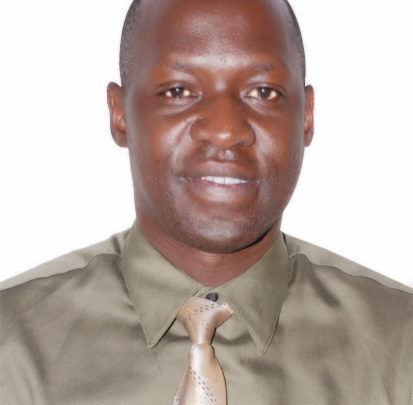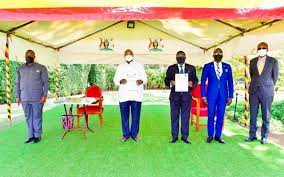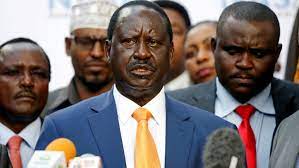
Global Politics
UGANDA: SHOULD POST COVID-19 EMPLOYMENT TAKE THE US PAY CHECK OR GERMAN KURIZABEIT SYSTEM?
The writer Aldon Grace Walukamba is a journalist and Communications Strategy Stragry
KAMPALA-UGANDA: When the Uganda economy, staggered a few weeks ago, Patrick Kiiza, a professional
carpenter in Bwaise, Kawempe division of Kampala suddenly found himself among the ranks
of the unemployed, alongside untold millions of other people around the East Africa and the
world.
But unlike some in western countries, Kiiza can rest easy, knowing that money will keep
flowing into his bank account until he gets back to work.
"I woke up a couple of hours later than I normally would. I won't lie," Kiiza said one
afternoon in Kabuwoko village earlier this month. "I took a nice long masked and gloved
walk. I always had personal training like a jogging session in about 20 minutes, until 5 th
April, 2020 when street jogging was outlawed."
Uganda has not like the United Kingdom that paid 80% of the salaries of laid off workers
because of the COVID -19 pandemic. The Uganda government does not have a subsidy
policy to cater for times like these, and many employers, including the Bwaise based
carpentry service where Kiiza works, have nothing to do.
Some workers have expressed worries about being left without health care coverage, another
area the Uganda National Health Service system has to look at.
Across Europe and in Canada, governments are easing the plight of workers idled because of
the COVID -19 pandemic by essentially paying part of their salaries, says Ramathan Ggoobi
a lecturer of economics at the Makerere University Business School.
Uganda cannot accord this to its employers now, “government should focus on key drivers in
the 2020/2021 budget like tourism, social development, agriculture and housing," Ggoobi
says. "And when social distancing ends, they will just return to work, the drivers act as
enablers for business to run almost at normal."
It's much more humane than in Uganda, where some an estimated 4.4 million employees may
lose their jobs in the next three months according to the Business climate index published in
May, 2020. Under the current Uganda system, workers are typically fired like was the case
for New Vision media group among others. They cannot file for unemployment benefits and
have to look for new work, without retaining their health insurance benefits.
Even if they are eventually employed again and there's no guarantee of those benefits, the
experience is brutal and anxiety-ridden, Albert Matsiko, Human Resource professional wrote
in a recent article in the media.
The systems in developed countries like the United Kingdom are also less disruptive for
businesses, who know that when the current crisis ends, they can simply call their employees
back to work right away, picking up where they left off.
"It basically means they we will survive and we will be able to keep the workforce on board.
So that's a pretty powerful tool actually for them," says Matsiko, who manages a Human
Resource department that employs 600 people at a factory in Jinja.
Uganda should learn from the German government which pays close 500,000 companies
much of the salaries to laid-off workers for up to 12 months during economic crises – The
Kurzarbeit system. That means Matsiko, doesn't have to worry that employees he's recruited
and trained over the years will defect to other companies.
In the United States, Congress approved a version of the German program called the Pay
check Protection Program, which provides small businesses with loans that are forgiven if
they retain or rehire furloughed workers.
The $349 billion U.S. program shortly run out of money after subsidizing a portion of the
beneficiaries, requiring Congress to negotiate for more funds.
Such a move would be expensive for Uganda, but the government is already ear marking
piles of money through the stimulus plan of close to one trillion shillings, but Albert Matsiko,
thinks otherwise.
"Wouldn't it be better to keep people's jobs, keep them employed, give them that security and
get ready to work again when we open this economy back up?" Matsiko said.
Among the skeptics is Dr. Ongora Jerome, a lecturer at Muteesa Royal University.
Programs like the stimulus plan end up funnelling money to companies that don't really need
it and probably would survive the pandemic without help, Dr. Ongora says.
If the economic downturn is brief, Dr. Ongora, is in favour of propping up some companies
like the developed countries are doing. But if there's a deep recession, a lot of companies are
inevitably going to fail, and not even rich countries like Germany can save them, Dr. Ongora,
says.
"If after a couple of months from now the business can't come back, it doesn't have enough
demand or supply, it doesn't have people coming in, as soon as the subsidies end they're
going to fire those workers," he says. Lending out money to businessmen only puts off the
inevitable day of reckoning with the looming reality.





